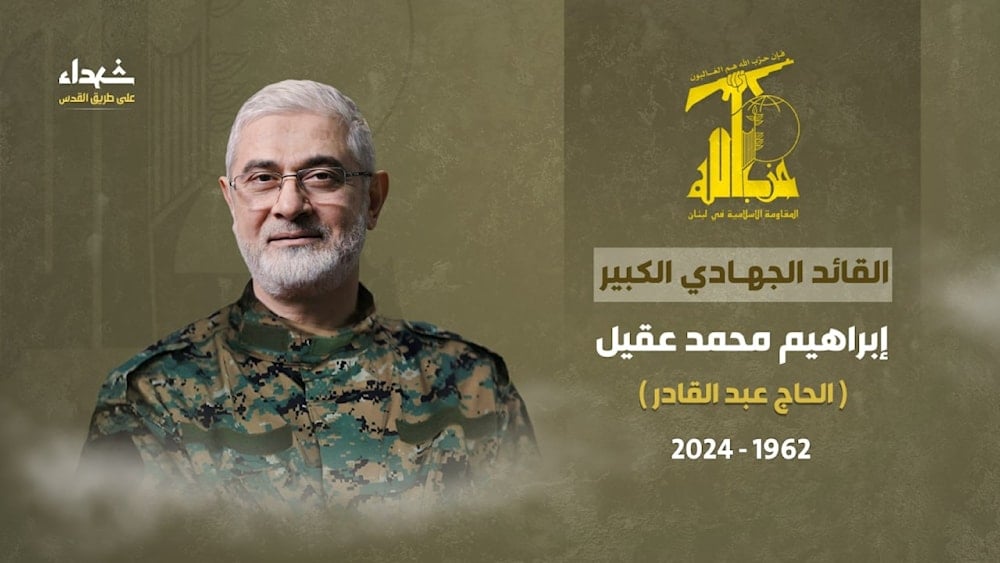Who was Hezbollah's Ibrahim Aqil, commander of the Radwan Force?
Hezbollah announced the martyrdom of Commander Aqil comes after a blessed life full of jihad, work, wounds, sacrifices, risks, challenges, achievements, and victories.
-

Martyred Commander Ibrahim Aqil (Military Media)
The Israeli occupation forces on Friday bombarded the Southern Suburb of Beirut targeting a residential building, crossing yet another red line that the Islamic Resistance in Lebanon had drawn and inflicting more terror on Lebanese civilians.
The strike was launched via fighter jet due to the size of the heavy bombs deployed. The target was a residential building in a residential area that houses a large number of schools, and Al Mayadeen reported that the aggression was comprised of four missiles hitting the building.
The strike constitutes the third violation of the stipulations put in place by Hezbollah, as they had underlined that Beirut was completely off-limits for the Israeli occupation with the war of attrition being concentrated in Southern Lebanon and the Beqaa Valley.
The deterrence equation would not be violated for just any target, and the Israeli occupation had shown before that it would only strike Beirut's Southern Suburb if the target was worthy of the escalation that would follow suit.
"Israel" struck Beirut only twice before Friday, the first being to assassinate the Deputy Chief of Hamas' Political Bureau, Sheikh Saleh al-Arouri, and the second being to assassinate Hezbollah top commander Hajj Fouad Shokor.
Who is Ibrahim Aqil
Ibrahim Aqil, also known as Hajj Abdul-Qader, is a senior Hezbollah official who has been operating with the Resistance since its inception in the 1980s, but very little information is known about him, as his life has been shrouded in secrecy due to the nature of his post. Hezbollah released a posthumous biography, detailing the many responsibilities the martyr took up during his lifetime.
Martyr Aqil, known by his aliases of Hajj Abdul-Qader and Hajj Tahsin, was born in 1962 in the town of Bednayel in the Baalbek-Hermel governorate in eastern Lebanon.
He was one of the founders of Hezbollah's military wing in Beirut, later leading the heroic battles and operations against the Israeli occupation and invasion of Lebanon in the 1980s.
The martyred leader assumed a handful of roles within the Islamic Resistance, such as responsibility for central training in the early 1990s and a fundamental role in developing its manpower capabilities.
Martyr Aqil took on a leading role in the General Staff in the mid-nineties. In 1997, the commander was firsthand responsible for Jabal Amel Operations, carrying out a number of important of operations during this time, a responsibility he continued to hold until after the liberation and Lebanon's victory.
Assassination attempts
There is only one attempt on Aqil's life that is known to the public, which was ahead of the occupation's withdrawal from Lebanon in 2000, wherein an attack helicopter fired a missile toward his location, which he survived. It is not known whether he sustained any injuries at the time.
'Terrorist' designation
Nothing was said about or heard of Aqil for the following 15 years until the US Department of the Treasury designated him as a "terrorist" pursuant to Executive Order 13582 for being a Hezbollah member, and then in 2019 as a "specially designated global terrorist".
Operations Command and Radwan Force
Martyr Aqil founded the Operations Command of the Islamic Resistance, and from 2008 onward, he served as the assistant to the Secretary-General, Sayyed Hassan Nasrallah, for operations affairs and was additionally appointed as a member of the Jihad Council.
In 2006, he emerged as one of the brave heroes and leaders who confronted the Israeli aggression on Lebanon. He then oversaw the establishment, development, and leadership of the Radwan Force in the Islamic Resistance until his martyrdom.
His work was not solely limited to confronting Israeli aggression or developing the Resistance's capabilities in Lebanon. He was among the senior commanders who planned and directed operations against the Takfiri groups along Lebanon's eastern borders, in Qusayr and Qalamoun, and other Syrian areas.
When the Palestinian Resistance launched Operation Al-Aqsa Flood in October, Martyr Ibrahim Aqil planned and oversaw the leadership of the Radwan Force's military operations, providing Gaza and Palestine with support from the Lebanese South.
Radwan Force
Aqil's name made its rounds in news reports back in December in light of escalating tensions between Hezbollah and the Israeli occupation, as Israeli media said he was identified as the head of the Radwan Force, which has been a heavy-hitter against the Israeli occupation forces during the ongoing confrontations on the northern front.
The Radwan Force is Hezbollah's elite unit, serving as one of the most efficient military units in the region. It is named after martyr Imad Mughniyeh, whose alias was Hajj Radwan. It is a commando force whose main goal is to penetrate deep into enemy territory.
Today, the force, under which various divisions operate, including armored, anti-armor, and fire-support divisions, stands as the culmination of martyr Moghniyeh and martyr Aqil's struggle in the face of the colonialist and imperialist ambitions in the region. Its name reverberates throughout the Israeli occupation and it is feared even by its upper echelons due to its vast and sophisticated capabilities.
Israeli senior officers have repeatedly underlined that the force is capable of launching coordinated attacks, including the infiltration of Israeli settlements or military positions, underlining that even in the midst of the war, it is undergoing extensive training to launch a ground offensive against the Israeli occupation.
While the assassination of Ibrahim Aqil is definitely a blow to Hezbollah, the Resistance movement said its steadfastness will not waver, and its operations will continue as normal. While leaders and commanders are of high importance to the movement, its continuation is not in any way dependent on any individual, as the structure ensures the preservation of the movement and its military operations regardless of the loss of any senior officials, with the goal of liberation at the forefront.

 6 Min Read
6 Min Read








